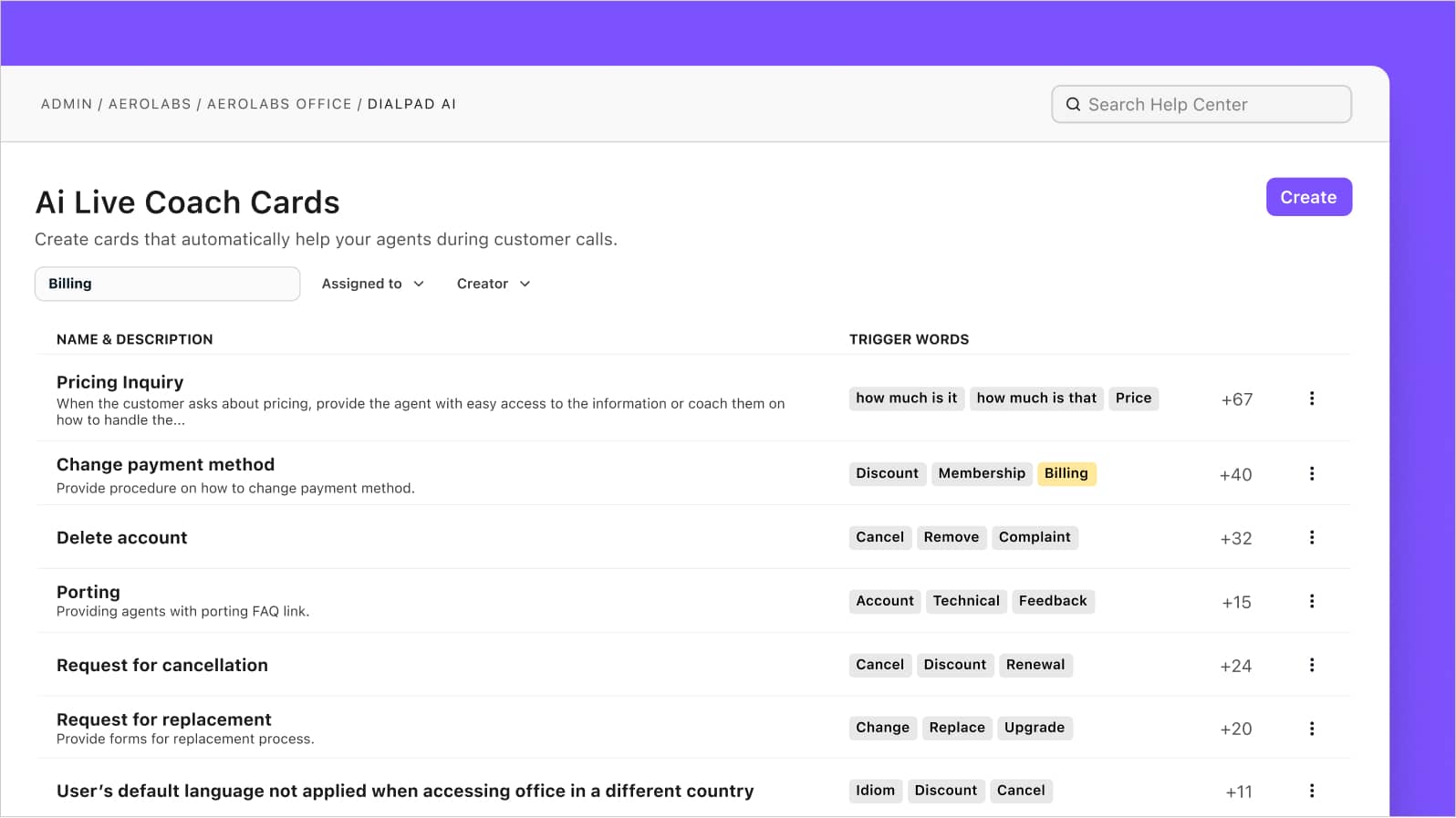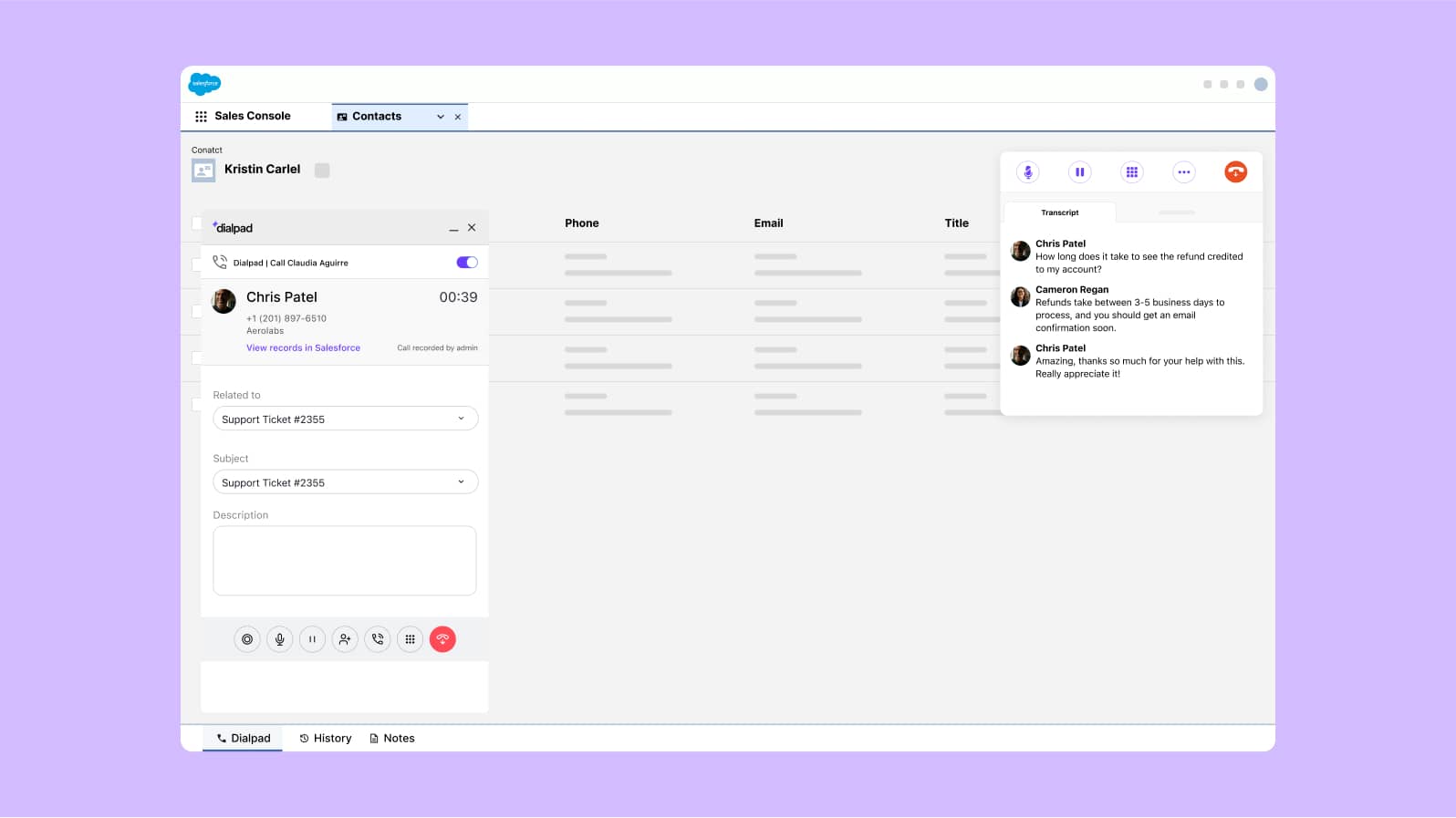Agentic Ai use cases: Real-world applications in 2025

Head of Ai Transformation

Sr. Product Marketing Manager

Tags
Share
As artificial intelligence continues to evolve, agentic Ai is emerging as a powerful new tool with the potential to truly revolutionize industries.
Unlike traditional or generative Ai models that simply respond to prompts or analyze data, agentic Ai operates with autonomy, proactivity, and goal-oriented behavior. What that looks like in contact centers: agentic Ai tools can make decisions, take action, and adapt in dynamic environments, all while working alongside humans. Gartner predicts that agentic Ai will autonomously resolve 80% of common customer service issues without human intervention by 2029—while lowering operational costs by 30%.
With so many organizations already actively exploring how agentic Ai can streamline operations, there is a wide variety of use cases for how it can enhance productivity while improving customer experiences across multiple sectors. In this blog, we’ll look at examples in detail, including use cases that are on the roadmap as we continue expanding our development of Dialpad Ai.

What is agentic Ai?
Agentic Ai refers to a new class of artificial intelligence systems designed to operate autonomously. These agents aren’t just responding to inputs—they also plan, reason, and act on these inputs.
At the core, agentic Ai systems possess capabilities such as contextual memory, decision-making, and dynamic adaptability. This means they can recall past interactions, adjust their behavior in real time, and collaborate across systems or with humans to accomplish tasks. Whether it’s handling customer issues in a contact center, optimizing supply chains, or monitoring patient health, agentic Ai is yet another step toward automating human-like agency in a digital environment today.
How does agentic Ai differ from traditional Ai?
While contact center Ai isn’t exactly new, the key difference between agentic Ai and traditional Ai lies in autonomy and initiative. Traditional Ai systems are primarily reactive—they respond to prompts, follow rules, or execute single commands. These systems can be powerful, but typically require human direction at every step and human intervention somewhere along the line. On top of that, traditional Ai’s main capability is in providing or generating content, whether for customers or to help agents as they’re talking to customers.
On the other hand, agentic Ai systems operate with much more independence. They don’t just wait to be told what to do—they analyze and evaluate what needs to be done as they’re interacting with a customer. For example, agentic Ai can plan and execute multi-step workflows, adapt its behavior based on how a conversation goes, and even coordinate with other agents or tools to complete more complex tasks.
What does this mean for businesses? A major evolution in how Ai can be integrated into real-world business processes.
Agentic Ai examples
From virtual contact center assistants that proactively resolve customer issues, to supply chain agents that adapt to shifting logistics in real-time, agentic systems are providing intelligent and dynamic automation.
Here are just a few examples of different types of agentic Ai—we’ll get into each one in more detail in just a bit:
Concierge agents that help businesses answer customer inquiries and schedule tasks in real-time
E-commerce assistants that provide customers with updates or tracking information on their orders.retell
Ai sales reps that autonomously handle multi-step tasks in CRMs
Customer service bots that manage escalations and follow-ups without agent intervention
Healthcare assistants that monitor patient data and recommend real-time treatment paths
Financial Ai agents that provide portfolio management suggestions, flag fraud, and automate reporting
Agentic Ai workflows: The key pillars
Typically, agentic Ai workflows can cover a wide range of tasks, from planning to autonomous execution, often even coordinating multiple steps to achieve specific goals. There are a few essential elements to consider:
Goal-oriented execution: Unlike simple Ai that only provides answers or suggestions, agentic Ai actively works toward completing tasks or solving problems. For example, rather than just responding to a question, the agent can plan the next steps, take actions, and follow through until the objective is met.
Memory and context: These agents don’t start fresh with every interaction. They remember previous conversations, actions taken, and outcomes achieved, which allows them to maintain continuity over time. This memory enables more personalized and effective responses, helping to build long-term value rather than just isolated interactions.
Tool integration: Agentic Ai is not limited to analyzing data or generating responses; it can directly interact with other software systems. By connecting to APIs, databases, and business tools, these agents can perform complex operations—such as updating records, making bookings, or triggering workflows without human intervention.
Multi-agent collaboration: Complex workflows often require different roles to be filled simultaneously. Multiple Ai agents can work together, each specializing in a part of the process—for example, in a contact center, one agent might analyze customer sentiment and plan the best resolution approach, another executes the follow-up actions like sending emails or updating records, while a third monitors the case status and escalates issues if needed.

An example of an agentic Ai workflow
What does an agentic Ai workflow look like? Here’s an example of how an Ai agent might handle a customer follow-up:
Trigger: A customer leaves a low CSAT score after a support call.
Detection: The Ai agent identifies the issue (the customer’s issue wasn’t solved successfully).
Planning: It drafts an apology email, proposes available times for a follow-up call with a senior support specialist, and prepares a summary of the issue for the human agent who will join the call.
Execution: It sends the email, updates the CRM, and schedules the meeting—all autonomously.
What are some real-world applications of agentic Ai?
By powering systems that are capable of autonomous decision-making and proactive behavior, agentic Ai is rapidly reshaping industries by going far beyond static automations. Let’s look at some industry examples showing how agentic Ai can make (or is already making) a tangible impact.
High-volume communications and contact center environments
Contact centers are a natural fit for agentic Ai. Unlike the legacy chatbots or scripted automations that some VoIP contact center solutions use, agentic Ai agents can:
Proactively follow up with customers after calls or chats
Understand customer sentiment across conversations and take action to improve the experience
Route tickets and issues intelligently based on urgency, history, or context
Collaborate with human agents to co-manage workloads, freeing up reps for high-impact conversations
Dialpad Support, our omnichannel contact center platform powered by Dialpad Ai, is designed with these principles in mind. What’s unique about Dialpad Ai is that unlike consumer-grade LLMs like ChatGPT and Claude, it’s leveraged by a selection of billions of minutes of business conversation data, making its outputs more accurate and hyper-relevant to business use cases. And because this technology is proprietary to Dialpad and built in-house, your data stays on Dialpad’s secure platform and doesn’t get transmitted to OpenAI or other third parties to be processed or analyzed.
Today, Dialpad Ai equips teams with tools like:
post-call Ai CSAT, which analyzes customer conversations in real time and infers a CSAT score while also providing actionable tips to help agents improve future interactions
Ai Scorecards, which speed up the QA and review process for managers by instantly analyzing and suggesting scores for agents’ conversations
Ai Live Coach Cards, which provide in-the-moment guidance during calls

With Dialpad's Ai, we saw an immediate impact," says Raymond Dunne, Vice President of Operations at Foley. "At Foley, regulatory compliance is mission-critical for our customer. We've created an extensive Ai Live Coach library that serves as real-time guides, ensuring our agents always provide accurate compliance information. This saves our supervisors hours each week."
Dialpad Support also integrates deeply with CRMs like Salesforce and HubSpot, automatically syncing call data, summaries, and action items within minutes—reducing manual work and paving the way for more autonomous systems:

Example: An agentic Ai might notice a recurring billing issue for a customer, open a support case automatically, and generate a personalized email with resolution steps without any human prompting.
Finance and banking
In finance, agentic Ai can transform everyday workflows by autonomously managing processes and even reacting to market conditions. According to Moody’s analysis, users of its Ai-powered Research Assistant “consume 60% more research while cutting task completion times by 30%. More significantly, over 90% of Ai interactions are now focused on high-value analytics, reflecting a structural transformation in financial workflows.”
Here are more examples of agentic Ai use cases in finance and banking:
Intelligent portfolio management based on user-defined risk profiles
Real-time fraud detection and auto-locking of accounts with customer alerts
Loan application pre-approval agents that analyze documents, risk factors, and compliance in minutes
Proactive reminders and financial planning recommendations tailored to user behavior
Example: An agentic Ai might detect unusual transaction behavior, pause the transaction, notify the customer via app, and initiate a verification workflow before escalation.
Healthcare
For clinics and other healthcare practices, speed, accuracy, and proactive care can make a life-saving difference. Agentic Ai can be a powerful ally in both clinical and administrative workflows, helping streamline operations, reduce manual workload, and support real-time medical decision-making:
Virtual care coordinators that monitor patient vitals and trigger intervention alerts
Appointment management, helping patients reschedule appointments through Ai agents that identify them, show available time slots, and update scheduling systems automatically
Agents that handle pre-authorizations, insurance verification, and billing workflows
Clinical decision support agents that recommend treatment plans based on patient data trends
Example: An Ai agent might notice a patient’s lab results suggest a rising risk of sepsis, alert the medical team, and suggest next steps—all before symptoms are visible.
Supply chain and logistics
Timing, accuracy, and adaptability to real-time traffic conditions are all critical in supply chain management. And while automation has brought a lot of efficiency to the industry, dynamic responsiveness is still vital for fleets to be successful. Agentic Ai empowers supply chain teams to anticipate disruptions, make faster decisions, and coordinate complex logistics across networks in a few ways:
Adaptive route optimization based on real-time traffic, weather, or inventory conditions
Autonomous inventory management—restocking, demand forecasting, and vendor coordination
Automated procurement and invoice reconciliation based on fluctuating supply
Example: An Ai agent could detect low stock in a high-demand store, shift inventory from another warehouse, notify vendors, and update logistics—all autonomously before a human agent manually checks stock levels.
HR and recruitment
HR operations is a particularly rich playground for agentic Ai, in part because there are so many predictable workflows. There’s huge potential for agentic Ai to streamline and scale HR operations by taking on the heavy lifting of repetitive and time-consuming tasks—while still delivering personalized, high-quality candidate and employee experiences:
Ai agents can autonomously screen job applications, extract key qualifications, and match candidates to the right roles
Recruitment screening agents that assess candidate fit through structured Q&A, then summarize insights for human recruiters
Onboarding agents that guide new hires through benefits enrollment, IT setup, and compliance documentation
Employee experience agents that proactively gather sentiment, flag engagement risks, and surface actionable insights to HR leaders
Example: An agentic Ai recruiter could identify a promising applicant from a job board, conduct a brief qualification interview, automatically score the candidate, sync the data into the HR system, and schedule an interview with the hiring manager—without requiring any human intervention.

Retail and E-commerce
Personalized shopping agents that learn customer preferences and make proactive product suggestions
Order tracking agents that can automatically authenticate customers, access order systems, and provide real-time shipping updates with delivery estimates and tracking options
Dynamic pricing engines that adjust prices in real-time based on competitor behavior or inventory
Post-sale support agents that handle returns, warranty issues, or reviews
Example: An Ai agent on a company’s retail website could identify a potential cart abandonment, send a personalized discount, and initiate a follow-up message if no response is received.
Agentic Ai tools
Building truly autonomous, goal-driven Ai agents requires more than just powerful models—you also need the right combination of tools, frameworks, and infrastructure.
Agentic Ai systems need to perceive context, retain memory, make decisions, and interact with external systems through APIs and tools. And even though you could build out your own system, the complexity and cost of building, maintaining, and scaling an agentic Ai ecosystem independently can quickly become a major barrier.
The best first step is to consult with your IT leadership to assess which existing tools can support agentic Ai and where there may be integration or scalability challenges. In many cases, adopting a fully integrated platform—especially one designed with native Ai capabilities for contact center operations—can significantly reduce setup time, lower complexity, and accelerate the path to real business impact.
Dialpad Support – a cloud contact center platform powered by native Ai that supports agent augmentation today and will soon support fully agentic applications like order tracking, appointment management, and autonomous follow-ups
AutoGPT and LangChain – an open-source framework that can be used to deploy Ai assistants to perform tasks for you
ReAct Agent – an Ai agent that uses the ReAct (reasoning and acting) framework to combine chain of thought (CoT) reasoning with external tool use, which makes it possible for an LLM (large language model) to execute more complex tasks and decision-making in agentic workflows
Zapier, Make, Workato and other workflow automation platforms – when paired with LLMs, these tools can form the foundation of agentic task execution
Some enterprise contact center platforms, like Dialpad Support, are rapidly advancing toward fully vertically integrated agentic systems, purpose-built for key business domains like customer support, sales, and operations. This means they’ll be able to deliver seamless, end-to-end automation and intelligence, enabling organizations to unlock new efficiencies, scalability, and more personalized customer experiences without the fragmentation or complexity of patchwork solutions.

Agentic Ai: Dialpad’s autonomous agent assistance system
Agentic Ai is Dialpad’s next-generation innovation. It is an in-house-built, autonomous agent assistance system that transforms how organizations work. It’s designed for real-time engagement and works seamlessly across all customer channels.
✅ Key Features of Agentic Ai:
Wherever customers need:
Deliver a unified experience across voice, video, and digital messaging channels, ensuring customers get consistent, intelligent responses—no matter how they reach out.Natural conversation:
Provide a natural, low-latency voice experience that feels truly human. It's purpose-built for high-quality real-time interactions, not retrofitted from chat.Autonomous assistance:
Agentic Ai supports customers and agents in real time with intelligent actions like handling routine queries, scheduling appointments, and checking order status—without needing human intervention.Seamless escalation to human agents:
When escalation is required, Dialpad’s Ai Agent instantly hands off to human agents with full conversational history and context—eliminating redundancy and improving resolution times.
Scalability with insight:
Easily deploy multiple bots for multiple channels, without sacrificing on insights. Drive better business outcomes from analytics across any interaction: voice, chat, and more.
Agentic Ai: The future of efficient customer service
As we move further into 2025, agentic Ai is quickly shifting from experimental to essential. Businesses across every sector, from healthcare to finance to logistics—are considering virtual contact center platforms equipped with advanced Ai agents that can reason, plan, and take initiative. These systems aren't just passive responders—they’re proactive partners, helping teams move faster, deliver better customer experiences, and operate with greater intelligence.
For companies looking to stay ahead, now is the time to explore how agentic Ai can fit into your workflows. Whether you’re automating follow-ups in a contact center or optimizing global supply chains, agentic Ai represents a major leap forward in digital transformation.
At Dialpad, we’re building toward a future where agentic Ai powers smarter conversations and intelligent action—at scale. If you're ready to transform how your teams work, let's start the conversation today.
Need a contact center platform that’s powered by industry-leading Ai?
From intelligent agentic Ai to real-time transcription and proactive follow-ups, Dialpad Support delivers business impact today—with more to come.
